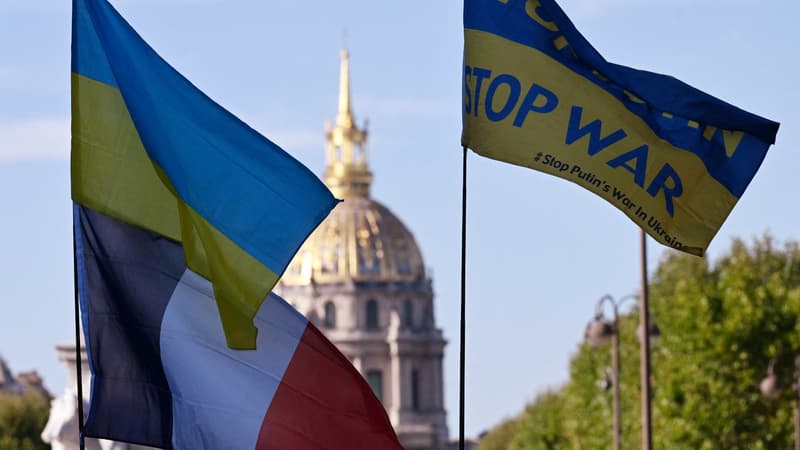From parliamentarians -such as Lesia Vasylenko, or Oleksiy Goncharov- to individuals -such as Yevgueny Lutsenko, a resident of Kharkiv-, Ukrainian interlocutors who speak excellent French have followed one another on the BFMTV antenna since the beginning of the conflict.
A (relative) Francophonie, despite the 2,400 km that separate kyiv from Paris and the national histories that we believe are equally distant.
300,000 students
How many are there in total? On the website of the French Embassy in Kyivwe read that 275,000 young Ukrainians learn French in primary or secondary school, including 14,000 in schools with “teaching in depth” (with more than double the number of hours of weekly lessons).
In higher education, 39,000 have done so their first or second foreign language. Alongside these general courses, technical universities present more specific French, structured around vocabulary related to, for example, engineering or civil engineering.
There are still 5,000 Ukrainians who speak French down a side street, at an Alliance française or at the Ukrainian French Institute in kyiv. Finally, some thirty courses train the French teachers of tomorrow who, in turn, will promote this trend.
In total, the number of these students is just over 300,000, a low level that seems modest. Except that it propels French to the third position of foreign languages studied in Ukraine after English and German. Russian, which, at least until the invasion, dominated especially in the east of the country, is not taken into account in this list.
soviet legacy
Without going back to the wedding of Princess Anne of Kiev to our King Henry I (around 1050, anyway), historian Alexandre Riou invites us to take a step back and look at the last decades of the Soviet Union. “French is already the third foreign language of instruction after German and English,” says this specialist in political and social history of contemporary Central and Eastern Europe.
A state of affairs that is not fortuitous, of course, and therefore rests on two very solid legs. “Between the late 1950s and early 1960s, cooperation between France and the Soviet Union strengthened,” explains Alexandre Riou, also a member of the group of experts The hetairia. “About two questions, the question of the book -in particular, the establishment of translation mechanisms- and the linguistic question”.
The latter is decisive. Because, specifically, this association promotes the teaching of French in the educational system of the USSR. “There is a statistic from 1976: 14% of the students learn French”, says Alexandre Riou first, who doubles this first figure from a survey carried out in 1972 by the Soviet regime on language courses in Moscow schools. Conclusion? 75 schools in Moscow, 48 teach English, 14 German, and in 13 schools – where 1,000 students are enrolled – French is taught”.
It is true that we are talking here only about Moscow and the strictly Russian part of the communist bloc, but the distinction with Ukraine is not necessary.
“We found this system throughout the USSR, Ukraine was no exception and it had to follow the same pattern,” the historian argues.
sign of distinction
A very mysterious scheme, moreover, but very deep-rooted. Slavic literature thus shows that it was already customary to speak French in good society in the 19th century. the War and peace Leo Tolstoy’s is full of notes “in French in the text” during exchanges between aristocrats at the court of Alexander I.
But this very particular Francophonie has good support according to our interlocutor. “Certainly there is this long tradition of several centuries”, begins Alexandre Riou. “But there is no reason for French to occupy such a place in education and continuously throughout the USSR, unlike English, with the challenges linked to the Cold War, and German, for exchanges with the GDR.”
However, we must try to understand the ins and outs of this French dominance.
“It was a sign of distinction to master French”, advances Alexandre Riou as the first explanatory element.
A tough-skinned poster: “France has regressed far from US hegemony as a state in globalization, but it manages to rise thanks to the attraction exerted by its culture.”
Ukrainian uniqueness
Another permanence from the past to our time: the practice of French is not uniform. Currently, French courses are given more in large urban centers, the historian points out: “This predominance of French learning in large urban centers could suggest elitism.”
Drawing the logical consequence from this table, one might imagine that the same is true for all the cities of the former empire of the tsars and the former socialist republics of the Soviet Union, at least in its European part.
But Alexandre Riou leans more in favor of a Ukrainian singularity in this relationship with the French. “Ukraine has a historical unity dating back to the 10th century but a very changing geography. And until 1938-1939, one part belonged to Poland, another to Czechoslovakia. I hypothesized that the dominance of French is more important in these historically more Francophile regions,” he postulates.
Towards a French renaissance?
This historical panorama raises one last question: are we facing the tail of a comet of a habit destined to be lost in globalization, the identity withdrawals, or can we hope to see this language gate narrow the gap between our two countries?
Alexandre Riou’s response incites optimism: “Ça se maintient, y compris parmi les jeunes générations. On trouve toujours une valorisation admirative de la culture française. not that way”.
And the historian even bets on a resurgence of the Ukrainian taste for French: “It is a phenomenon that could occur naturally. The population can clearly see that the great powers, the Europeans, did not question their loyalty to the attacked Ukraine for a moment.” “. .
“Ukrainian refugees in France who would return to the country can induce new linguistic dynamics,” he adds.
Testing the hypothesis requires some patience. First, Ukraine must find peace.
Source: BFM TV


